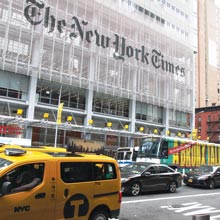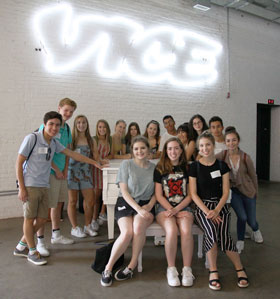The New York Times
- Details
- Published: Thursday, 10 January 2019 14:25

Telling the Truth: One frame at a Time
WRITERS: C.C. Clark, Sabine Lloyd and Kyle Austin
REPORTERS: Lily Baldwin, Kylar Flynn, Brandon Lopez, Simone Harper, Angie Gonzalez, Jacqui Martin, Lauren McKechnie, Claire McKechnie, Samantha Michaels, Josh Santos, Anna Silverman, Campbell Slavin and Lilli Wanninger (FROM: Community School, Drew, Redwood High, Marin Academy, San Rafael High, St. Ignatius Preparatory, Tamalpais High and University High Schools)
It’s easy to spot somebody who’s in love with their job. When they start to talk about whatever line of business it is they’re in, a spark appears in their eye and they enjoy telling you about the amazing things they get to do every day. When we met Andrew Blackwell, the supervising editor of the Op-Docs section of the New York Times and author of the book Visit Sunny Chernobyl, it was clear from the get-go that he’s one of those people. Throughout our interview at the Times Tower in Midtown Manhattan, he shared stories about his job in a breathless, almost zealous manner, like he wanted us to know everything about what he does so that we, too, would come to appreciate the beauty and relevance of (in his case) the creation and editing of acclaimed online documentaries. By the end of the interview, we did.


